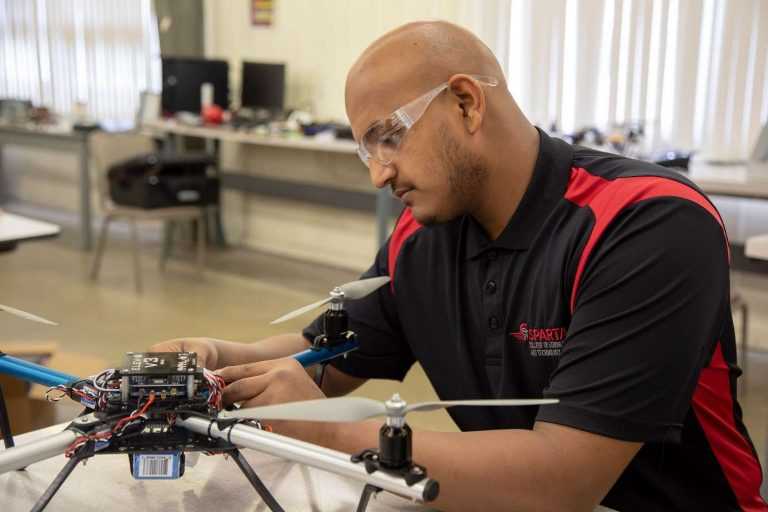

Aviation Electronics Technology (AET), or avionics, is a critical part of the aeronautics industry. Spartan College of Aeronautics and Technology provides training to folks looking to enter the Aviation Electronics Technology industry.
Aviation Electronics (Avionics) technicians are responsible for troubleshooting, inspecting, maintaining, repairing, and installing avionics equipment on aircraft, including planes and helicopters. In this exciting aerospace field, you may run diagnostic tests on the onboard equipment on a plane, make repairs at a workbench, or troubleshoot equipment to make sure everything runs smoothly without any conflicts or interference between systems.
We’re glad you asked.
Aviation Electronics Technology (Avionics) is a specific field of aircraft maintenance involving aircraft electrical systems. This includes navigation equipment, radios, autopilot, entertainment systems, cables, and so forth. It is highly important that these systems be in proper working order and that none of them interferes with any of the others. Avionic technicians are the individuals that ensure each vital component is in working order.
Training in the field requires precision since the equipment involved is critical to the operation of the aircraft. That means, lives are at stake, including the pilot and the passengers.
Some items are also highly complex, so repairs may necessitate high-precision tools and techniques. For example, soldering a circuit board on a critical piece of equipment will usually involve a microscope or magnification. Professionals in the field know that details matter.
Working with aviation electronics also usually involves tight deadlines since aircraft must keep to a set schedule. Technicians may work at night to handle repair orders filled out by pilots during the day. The exception to this is a hangar technician. Since planes will often be in a hangar for weeks on end, there’s often less pressure to meet strict deadlines and can work at more gradual pace to get the aircraft in flying condition again.
There are three primary areas that technicians may specialize in. These include:
· System troubleshooters, who draw on years of experience to diagnose complex problems.
· Line technicians, who complete inspections on airline aircraft and diagnose basic problems. They will also perform installations, upgrading equipment to the latest and greatest technologies.
· Bench technicians, who complete repairs on faulty equipment.
Within these areas, there may be further levels of specialization, especially for bench technicians. One may be an expert on communication equipment assemblies, whereas another may focus more on engine monitoring equipment. Specialty depends on what is needed and experience.
When getting ready for a career-training in aviation electronics technology, you will need to get used to working within strict deadlines and paying close attention to detail. Careful, logical diagnosis is key to resolving issues quickly, so you will need to be well versed in the area of avionics. Spartan College of Aeronautics and Technology can provide you with the education and experience you need to be ready for an entry-level career in this area. For more information, contact us today.
Fill out the form below and a Spartan College representative will help you along with our information about our AET program:
Affiliate Partner Program | Jobs at Spartan | Privacy Policy | Opt-out Policy | Privacy Notice - California Residents| Notice of Non-Discrimination | Website Accessibility Help | Transparency in Coverage Act
© 2024 SPARTAN COLLEGE OF AERONAUTICS AND TECHNOLOGY. ALL RIGHTS RESERVED.